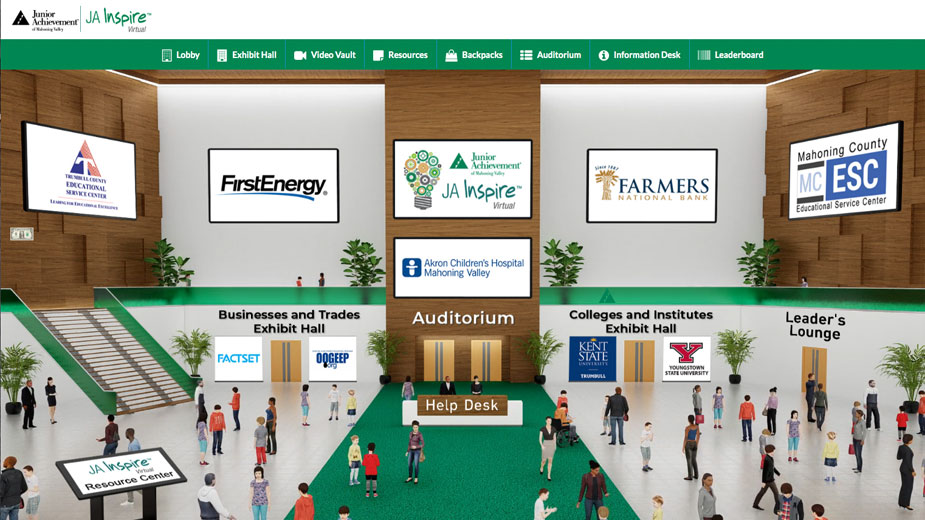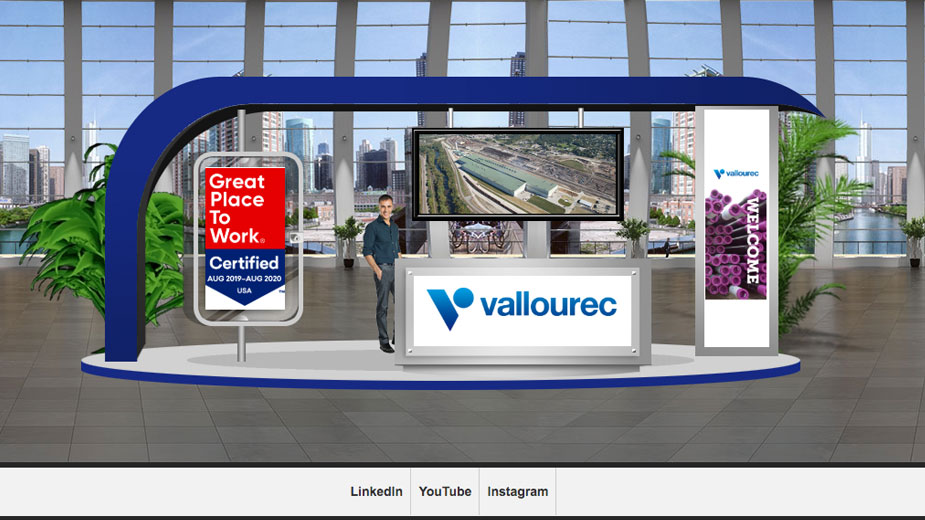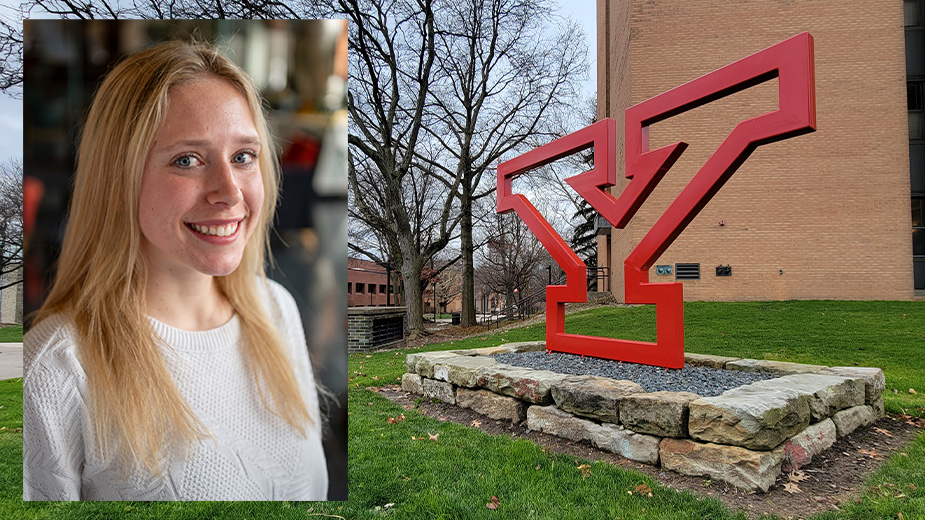JA Inspire Brings College and Career Fair to the Virtual Screen
YOUNGSTOWN, Ohio — More than 1,000 students Thursday visited with area employers and educators, sat in on college and career presentations and heard from regional leaders on what awaits them after high school – all without leaving their computers.
Junior Achievement of Mahoning Valley, in cooperation with the Mahoning and Trumbull county educational service centers, hosted its JA Inspire Virtual event Nov. 19, welcoming students from Mahoning, Trumbull, Columbiana and Portage counties. The fully virtual event used the vFairs virtual event platform to recreate the college and career expo experience, complete with a fully interactive lobby and information desk.
Upon entering the virtual “hall,” participants could select from several options in the lobby, including exhibit halls, an auditorium, help desk and resource center. The resource center included a database of downloadable material provided by Junior Achievement and some of the exhibitors and presenters. Any information downloaded from the resource center or from exhibitor booths were collected in a student’s “backpack” to review later.
Many of the students who attended did so in their classrooms under the supervision of a teacher, said Michele Merkel, president of JA Mahoning Valley. Some 7,000 students registered for the live event, but because some schools are going back to all remote learning, they didn’t want students logging in unsupervised so couldn’t attend the live event as planned.
All students will be able to access the content, exhibitor booths and speaker videos for the next three months, Merkel said.

Exhibit halls and the auditorium saw the most action from the experience. Exhibitor halls were divided between educators – colleges and institutes – and employers, including area businesses and the skilled trades.
Each of the 55 exhibitors customized their booth with pictures, graphics, downloadable documents and links for social media and websites. Some included a chat feature, allowing participants to interact directly with representatives manning the booth.
At the end of the first session, 15,596 documents had been saved to a backpack, 25,117 booths were visited and more than 3,600 videos were viewed at exhibitor booths, Merkel said.

Other booths focused on specific industries and provided relevant information. Those booths included such industries as architecture and construction, agriculture and natural resources, arts and communication, business and management, finance, health science, and education and training, among others. Information included a brief overview of the industry and links to specific job types within that industry, which took students to that job’s specific page on the CareerOneStop.org website.
In the auditorium, participants could choose from 14 presentations to attend. The 30-minute presentations began every half hour and featured a keynote speaker who touched on the basics of a particular topic.
Representatives from regional universities discussed the college pathway and what students should expect. For those interested in manufacturing and the trades, representatives from The Builders Association of eastern Ohio and western Pennsylvania, the Mahoning Valley Manufacturers Coalition and area employers discussed apprenticeship opportunities and employability.
Bethanne Rettos, a guidance counselor with Beaver Local School District, said she appreciated the variety of information being shared. Typically, the guidance office conducts meetings and information-sharing sessions with the school’s seniors about FAFSA and early applications, but with the pandemic, those meetings can’t be held.
“This is one of the very first things that we’ve been able to do because most things we haven’t figured out how to do remotely yet,” she says. “So we’re extremely grateful that JA and Mahoning County [Education Service Center] were able and willing to step out on a limb and do this for us.”
One student she spoke with said he’s considering pursuing art therapy in college because he saw the job listed on the arts and communication booth. She also enjoyed the interactive quiz the MVMC Executive Director Jessica Borza used in her presentation, which “addressed a lot of the false stereotypes that exist” about manufacturing, she said.
“I just thought it was great because it was interactive, even though it was virtual,” Rettos says. “And it also addressed some of the stereotypical ideas that aren’t actually true.”

For students interested in attending college, James Ritter, director of enrollment management, student services and advising at Kent State University at Trumbull, gave an overview of what they can expect in the College 101 seminar. Ritter reviewed the different types of post-secondary education, how admission works, what types of degrees are available and how students should begin the college hunting process.
“I recommend students do one thing and one thing only: first, decide your top three majors,” Ritter said. “Then pick three schools that have those programs.”
From there, he advised students to determine which of those schools is the “dream school,” which is Plan B and which is a safety net. That’s important, he said, because the average college student changes his major at least once over the course of four years. Picking a school that offers their top majors makes it easy to switch rather than trying to start the college search process over again, he said.
He also shared some advice on how to approach the first year in college. Above all, he told students that to be successful in college, they will need to study “at least two hours” outside of class for every hour in class.
Youngstown State University President Jim Tressel agreed, adding that planning is paramount to success, whether in college or the trades. Dreaming, planning and setting goals comprise the first step in the journey of success that Tressel touched on during his presentation.
“Anytime that we’re going from Point A to Point B … the first thing we have to do is think about what it is we want to do when we get there, what’s the path to get there,” he said. “Then it comes down to the next step, which is we’ve got to go to work.”
It’s also important to know how to handle adversity and success, he said. This step can be the most challenging, because sometimes when people experience success, they can become complacent, he said.
“Maybe they stop working as hard,” Tressel said. “When things are going well is the time to make sure you continue to put that work in.”
Finally, belief in oneself is vital to achieving any goal, he said. And while staying motivated can be a challenge, Tressel advised students to surround themselves with like-minded people – be it friends or mentors – who they can feed off of and seek encouragement. That’s particularly important for college students, he said.
“To stay motivated means to stay curious,” Tressel said. “If you’ll surround yourself with the right friends and get engaged with the faculty, and keep that plan right in front of you … we’ll be able to help you keep that level of motivation to help you be successful.”
Whether a student goes into college, a trade school or enters into an apprenticeship, they will need to be able to market themselves when looking for a job. Chris Allen, North American talent acquisition manager for Vallourec USA Corp., explained the difference between soft skills and technical skills, as well as the importance of both.
Soft skills are personal qualities that make someone a good employee and compatible to work with, he said. Those can include a positive attitude, strong communication skills, nonverbal communication, problem solving and working well with others. Some employers have applicants complete a soft-skills assessment prior to an interview.
“You have to be able to come in, tell people what your message is, be comfortable speaking with people you don’t know and tell everybody about yourself,” he said. “Are you able to market your abilities and attributes.”
The most important question to be able to answer is “Tell me about yourself,” which goes beyond personal interests, he said. Applicants need to be prepared to discuss past experiences and accomplishments, and how that experience led the applicant to the interview, he said.
Even if an applicant has no technical skills yet – skills required to work a job – he advised students not to discount part-time jobs or the work they’ve done in school.
“You’ve worked on projects. You’ve worked on teams. You’ve done research papers,” he said. “All that stuff is experience for you. Have the confidence in the things that you’ve done … and be able to speak to that.”
Other topics covered by speakers included entrepreneurship, marketing, tuition, financial aid and financial literacy.
A second session was hosted Thursday evening for students and their families. All of the webinars and downloadable materials will be accessible for the next 90 days for free. To access the event, go to JAMVInspire.vfairs.com and log in or create an account.
Pictured at top: More than 1,000 students attended the virtual JA Inspire event Thursday, with some 7,000 registered expected to revisit the archived content for another 90 days.
Copyright 2024 The Business Journal, Youngstown, Ohio.



